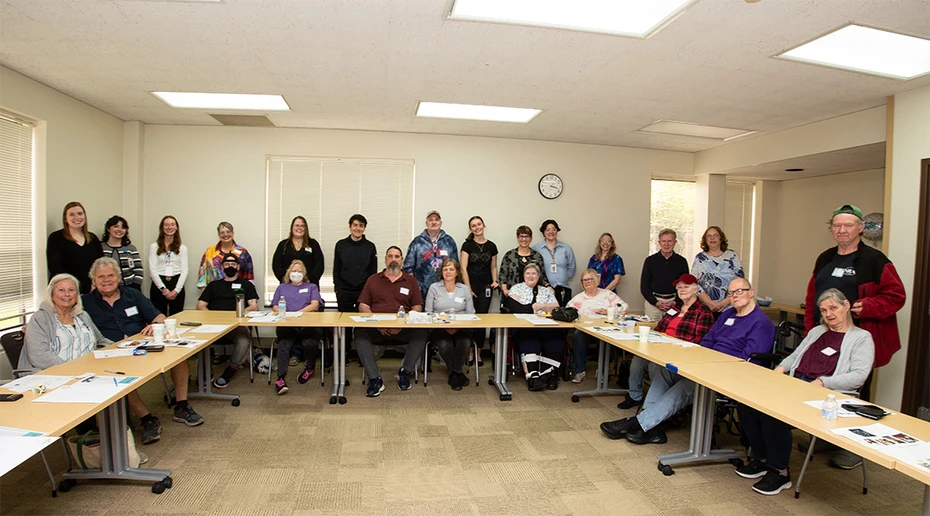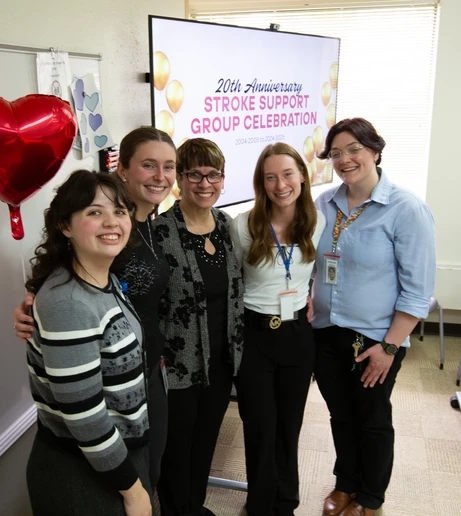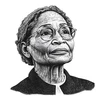Support meetings are devoted to group conversations, group activities and presentations. Graduate students earn clinic hours by working with clients and family members while gaining valuable experience in the treatment process.
“We come together to do stroke and traumatic brain injury education and counseling. A lot of our presentations are about a particular topic related to stroke- or post-TBI functioning or mental health,” explained Meg Burnard, a student from Rochester, NY
“I really enjoy talking to people who are post-stroke or post-TBI; they have a lot of different experiences,” Ms. Burnard said. “They are all living a life that is significantly different than it was before, and they are making changes, getting up every day, and seeing progress (they are making) is really cool to see.”
Graduate students interact with clients of all ages who have completely different stories or backgrounds, said Caitlyn Ferguson, a student from Wellsville, NY. “They’ve taught me so much more than I’ve learned in classes.”
The focus of support group meetings is learning to live with deficits that result from a stroke or TBI and how to compensate for them, explained student Lauren Dufresne, of Hamburg, NY.
“In the last session we talked about using communication devices, such as text-to-speech, to help communicate. We also talked about strategies for non-verbal communication,” Ms. Dufresne added.
A variety of activities that include the word association game “Taboo” can contribute to the recovery process in support meetings, said student Emma Bensen, of Binghamton, NY. “It’s good for word-finding, which lots of clients struggle with.”
Dufresne, who worked with children as a graduate student, is gaining valuable experience assisting adults at the support meetings and recognizes how important these sessions are. “It’s very helpful for them. I think they find a sense of community hearing other people with the same stories,” she added.
“I think any opportunity to talk to people in this population helps you to contextualize the problems they are facing and the struggles they are facing,” Burnard said.
A search for a Speech-Language Pathology graduate program that was both affordable and close to home brought Burnard to SUNY Fredonia. She worked in a preschool and as a teaching assistant at an elementary school for two years after earning an undergraduate degree in Communication Disorders and Sciences at Syracuse University.
Clients can experience language or speech deficits – not being able to retrieve a specific word they want to use or to speak in complete sentences – as well as social inactivity.
How have area residents who have survived a stroke benefited by attending support groups meetings?
“I learned that I am not alone,” said Linda Will.
“My family tries to understand what I’ve been through, but until you actually live it, you don’t know what people are going through. Going to support groups is different. We each understand what the others have gone through,” Ms. Will explained. “Our language is a little bit different because of what we’ve gone through,” she said.
“It’s kind of refreshing that people understand what we’re going through,” she added. With the exception of the COVID pandemic, Will has regularly attended support meetings for the last 12 years.
Attending support meetings has been very beneficial for Janelle Hartloff and her husband, Duane. “It’s helpful to have people who understand aphasia,” she explained, a condition in which a stroke survivor cannot communicate what they want to say. “He has knowledge that he can’t express, can’t get the words out,” Ms. Hartloff said.
“For us to be there, among people who understand and can empathize with our situation, has meant a lot to us,” she added.
Group meetings always include a fun activity that helps with memory, such as word finding, and provide educational materials that explain different types of impairments that somebody who suffered a stroke or traumatic brain injury can have, said a mother whose son suffered a brain injury in a motor vehicle accident.
“It gives them an opportunity to be around other people who are suffering with the same conditions,” she explained. “A lot of times in regular society, people tend to shun you and not communicate with you, and friendships go by the wayside because the person is not the same person they were before they suffered a brain injury.” she said.
“It’s nice to interact with people who understand,” she added.
Students learn how a brain injury or stroke impacts a person mentally at the sessions. The groups also support clients socially, Ferguson explained, as many have difficulty with social skills, but meeting people who have similar experiences is very helpful.
For Ferguson, who earned a Communication Disorders and Sciences degree at SUNY Fredonia in 2024, support meetings have helped her to appreciate the benefits of social communication and how a stroke or TBI can impact an individual emotionally and also how she can work with them to implement supportive measures into therapy sessions.
A client confided to Ferguson, as they were playing cards together, that the client has had difficulty making friends ever since suffering a TBI but that’s changed since joining the support group. The client is able to reconnect with the community and talks with other stroke survivors and students at the meetings.
“It’s highly rewarding seeing how much they benefit (from the sessions) and become more willing to participate in conversations,” Ferguson observed.
Feedback from those attending group meetings is overwhelmingly positive. “People who have come here talk about how much it’s helped them,” Barnard said. “They keep returning and are happy to be here.”
Added Ms. Bensen, “I really enjoy the feedback we get from clients and caregivers. They just appreciate our coming (to the support groups) so much. I feel like I’m making a difference.”






